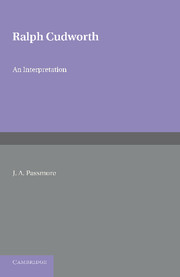Book contents
- Frontmatter
- Contents
- Preface
- Abbreviations
- CHAPTER I Cudworth and his Predecessors
- CHAPTER II Cudworth on Mind and Nature
- CHAPTER III Cudworth's Theory of Knowledge
- CHAPTER IV ‘Eternal and Immutable Morality’
- CHAPTER V Cudworth's Moral Psychology
- CHAPTER VI The Good Life
- CHAPTER VII Ethics and Religion
- CHAPTER VIII Cudworth and the British Moralists
- Appendix: The Cudworth Manuscripts
- A Cudworth Bibliography
- Index of Names
CHAPTER II - Cudworth on Mind and Nature
Published online by Cambridge University Press: 05 June 2016
- Frontmatter
- Contents
- Preface
- Abbreviations
- CHAPTER I Cudworth and his Predecessors
- CHAPTER II Cudworth on Mind and Nature
- CHAPTER III Cudworth's Theory of Knowledge
- CHAPTER IV ‘Eternal and Immutable Morality’
- CHAPTER V Cudworth's Moral Psychology
- CHAPTER VI The Good Life
- CHAPTER VII Ethics and Religion
- CHAPTER VIII Cudworth and the British Moralists
- Appendix: The Cudworth Manuscripts
- A Cudworth Bibliography
- Index of Names
Summary
The intention of Cudworth's philosophy is, of course, theological, but this is not to say that he sets out to establish the truth of a particular dogmatic theology. The recurrent contemporary criticism of Cambridge Platonism was that it placed far too little stress on creeds and doctrines; as Masson puts it, ‘for all systematic and rigid Christians, it glorified human reason too much, made the essence of religion to consist too much in a few great beliefs and in noble aspirations after a godly life in accordance with them, and it scouted too much the authority of definite and minute objective creeds.’ Still, there were the ‘few great beliefs’: these had to be vindicated; to put the problem in Kantian terms, it had to be shown how the godlike life was possible, a possibility which was ruled out, Cudworth thought, on more than one of the world-views of his contemporaries, the Calvinistic as much as the Hobbist. Two ‘great beliefs’ had particularly to be sustained: the first, that there is a natural distinction between good and evil, not dependent upon legislation, human or divine, but inherent in certain kinds of life; the second, that human beings have the power of choosing to act well or to act badly.
Cudworth's original plan, he tells us, was simply to write ‘against the fatal necessity of all actions and events’, but he soon saw that human freedom could not be defended as an outpost, that it is only defensible on a certain general scheme of things. So he was led to embark upon an elaborated metaphysics, although with his original purpose never far from his mind.
This metaphysics, the main theme of The True Intellectual System of the Universe, is presented in the form of a sustained polemic against atheistic materialism. Not that Cudworth had any desire to reinstate a scholastic-Aristotelian theory of nature; in his eyes, the great virtue of the new science was that it had revived the atomic theory of body, which furnished, so he thought, the most secure of all foundations for theism.
- Type
- Chapter
- Information
- Ralph Cudworth , pp. 19 - 28Publisher: Cambridge University PressPrint publication year: 2013

